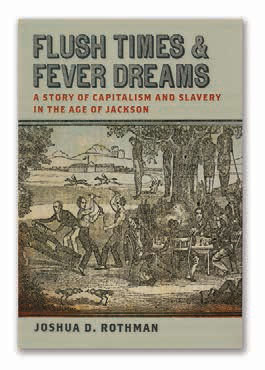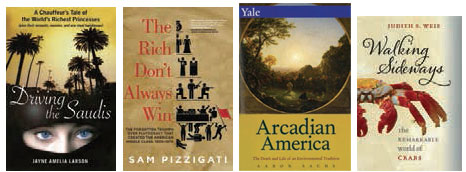Flush Times & Fever Dreams
by Joshua D. Rothman ’94 (Georgia)

The 1830s were turbulent times in Mississippi. Following removal of the Choctaws and Chickasaws, farmers, speculators, merchants, and confidence men poured into the state to seek their fortunes in the land rush and subsequent cotton boom. Against this frenetic backdrop, rumors of an impending slave rebellion alarmed plantation owners and led to several hangings. Rothman, an associate professor of history at the University of Alabama, shows how the combination of questionable financial practices, unsustainable debt, and reliance on slave labor underpinned the Panic of 1837 in antebellum Mississippi.
Driving the Saudis by Jayne Amelia Larson ’83 (Free Press). When Larson—an actress moonlighting as a chauffeur—was hired to drive visiting Saudi royalty around Los Angeles, her gender came in handy in ways she could not have expected. As the only female in a group of forty drivers, Larson gained unique access to the daily lives of Princess Zaahira and her family and entourage. The book chronicles how she met a teenage royal obsessed with American pop culture, learned of the sacrifices of young servants who support extended families, and befriended a nanny who helped her navigate this secretive world.
The Rich Don’t Always Win by Sam Pizzigati ’70, MAT ’71 (Seven Stories). Few Americans know about the struggle to create a middle-class society where average families could enjoy security and comfort. “Over the first half of the twentieth century, we beat back plutocracy, rule by the rich,” writes Pizzigati, a labor journalist. He warns that in recent years our economy has grown markedly more unequal. “By 2007, the nation’s top one percent was raking in 23.5 percent of the nation’s income. Back in 1928, on the eve of the Great Depression, this top one percent grabbed a nearly identical 23.9 percent.”
Arcadian America by Aaron Sachs (Yale). “Our forebears were obsessed with the possibilities of Arcadia,” writes Sachs, an associate professor of history at Cornell. “That ancient society of pastoralists who wandered free over a broad countryside of mountain meadows and forest glens also established the kinds of stable civic institutions that ennobled Aristotle’s Athens.” He argues that scholars have tended to dismiss nineteenth-century Arcadians—like Thoreau, or the landscape architect Andrew Jackson Downing—as dreamers or elitists who were ultimately complicit in the mainstream embrace of Manifest Destiny. Instead, Sachs sees them as both men of their time and environmental prophets.
Walking Sideways by Judith S. Weis ’62 (Cornell). Crabs are found all over the world, from shorelines to flotsam in the open ocean to deep sea volcanic vents, and come in a variety of sizes, from the quarter-inch pea crab that lives inside oysters and clams to the giant Japanese spider crab, which can have a leg span of twelve feet and weigh more than forty pounds. Weis, a professor of biology at Rutgers University, Newark, emphasizes crabs’ unique biology; examines the effects of overfishing, pollution, climate change, and loss of habitat; and analyzes their role in popular culture.
Non-Fiction
Inside Rehab by Anne M. Fletcher ’74 (Viking). Drawing on hundreds of interviews with patients and staffers, a medical writer investigates the current state of addiction rehab programs across the nation, from the Hazelden Foundation to the celebrity center Promises. She gives a realistic picture of what goes on in rehab, uncovers myths about treatment, and provides a guide for finding the most effective, affordable, and timely options for recovery.
Lights! Camera! Action and the Brain edited by Maher Bahloul, PhD ’94, and Carolyn Graham (Cambridge Scholars). “From education to entertainment to revolution, the visual culture is fast growing,” writes the director and general manager of the Education Through Arts Institute. He and his co-editor describe the neurological foundations for media literacy and ask why there isn’t a “Hollywood” in every educational institution.
Pay by Kevin F. Hallock (Cambridge). A professor in the ILR school helps demystify such topics as wage differences across groups, how organizations set executive pay, and the difference between compensation and the total rewards of a position, which can include insurance, retirement benefits, career growth, and job stability.
Depression by Ann Cvetkovich, PhD ’88 (Duke). Combining memoir and critical essay, a professor of English at the University of Texas, Austin, tries to find ways to write about depression as a cultural and political phenomenon rather than relying on a medical approach.
Sources of Vietnamese Tradition edited by George F. Dutton, Jayne S. Werner, PhD ’76, and John K. Whitmore, PhD ’68 (Columbia). In this anthology, a group of experts on Southeast Asia select texts that illustrate two thousand years of Vietnamese history.
The Circumcision Decision by Susan Terkel ’70 & Lorna Greenberg (Carrot Seed). Deciding whether or not to have your male infant circumcised can be difficult for many parents. A medical writer and her co-author explore the medical, religious, sexual, and cultural factors for making an informed decision.


